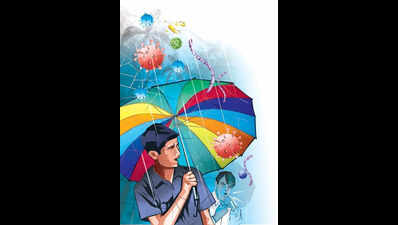Health
Monsoon Poses Increased Risks for Asthma and COPD Patients

The arrival of the monsoon season brings both relief from summer heat and heightened health concerns, particularly for individuals suffering from respiratory conditions such as asthma and Chronic Obstructive Pulmonary Disease (COPD). In Prayagraj, experts caution that the combination of high humidity, fluctuating temperatures, and increased allergens can significantly worsen respiratory symptoms for vulnerable populations.
According to Dr. Abhishek Singh from the Department of Tuberculosis and Respiratory Diseases at Swaroop Rani Nehru Hospital, patients with asthma and COPD must take extra precautions as the monsoon progresses. “High humidity levels, sudden temperature changes, and the prevalence of allergens like pollen, mould spores, and dust can exacerbate respiratory distress,” he stated.
Precautionary Measures for Patients
Dr. Singh advises patients to limit outdoor activities during heavy rain or in highly humid conditions. For necessary outings, wearing a clean mask or cloth over the nose and mouth can help reduce inhalation of airborne allergens. Keeping indoor humidity manageable is also crucial; the use of dehumidifiers or air purifiers can prevent mould growth and dust accumulation.
To mitigate indoor allergens, Dr. Singh suggests regularly sun-drying wet clothes and bedding. Thorough cleaning of areas such as bathrooms, kitchens, and poorly ventilated rooms is essential for stopping mould from thriving in damp conditions. In case of respiratory infection symptoms—like a cold, cough, or breathlessness—patients should seek immediate medical attention.
Recommended Practices for Maintaining Health
Dr. Singh emphasizes the importance of adhering to prescribed inhalers and medications without interruption, keeping emergency medicines readily available. Regular breathing exercises, including pranayama or light respiratory workouts, can help strengthen lung function.
Dietary choices also play a role in respiratory health. Patients are advised to avoid extremely cold or stale food and instead opt for warm, easily digestible meals, ensuring they stay hydrated with plenty of fluids. Furthermore, limiting exposure to indoor plants and pets can help reduce allergens in the home.
With the monsoon often bringing sudden spikes in the Air Quality Index (AQI) and pollen counts, Dr. Singh notes that staying indoors is the safest option for those with respiratory conditions. He encourages practicing good hygiene, including regular handwashing and wearing masks, to prevent infections.
As the monsoon continues, maintaining vigilance and implementing these preventive measures can significantly improve the quality of life for those battling asthma and COPD.
-

 World5 months ago
World5 months agoSBI Announces QIP Floor Price at ₹811.05 Per Share
-

 Lifestyle5 months ago
Lifestyle5 months agoCept Unveils ₹3.1 Crore Urban Mobility Plan for Sustainable Growth
-

 Science4 months ago
Science4 months agoNew Blood Group Discovered in South Indian Woman at Rotary Centre
-

 World5 months ago
World5 months agoTorrential Rains Cause Flash Flooding in New York and New Jersey
-

 Top Stories5 months ago
Top Stories5 months agoKonkani Cultural Organisation to Host Pearl Jubilee in Abu Dhabi
-

 Sports4 months ago
Sports4 months agoBroad Advocates for Bowling Change Ahead of Final Test Against India
-

 Science5 months ago
Science5 months agoNothing Headphone 1 Review: A Bold Contender in Audio Design
-

 Top Stories5 months ago
Top Stories5 months agoAir India Crash Investigation Highlights Boeing Fuel Switch Concerns
-

 Business5 months ago
Business5 months agoIndian Stock Market Rebounds: Sensex and Nifty Rise After Four-Day Decline
-

 Sports4 months ago
Sports4 months agoCristian Totti Retires at 19: Pressure of Fame Takes Toll
-

 Politics5 months ago
Politics5 months agoAbandoned Doberman Finds New Home After Journey to Prague
-

 Top Stories5 months ago
Top Stories5 months agoPatna Bank Manager Abhishek Varun Found Dead in Well









